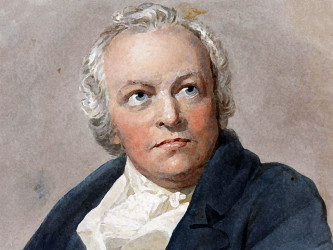The Little Vagabond
Dear mother, dear mother, the Church is cold;
But the Alehouse is healthy, and pleasant, and warm.
 Besides, I can tell where I am used well;
Besides, I can tell where I am used well;
Such usage in heaven will never do well.
But, if at the Church they would give us some ale,
And a pleasant fire our souls to regale,
We’d sing and we’d pray all the livelong day,
Nor ever once wish from the Church to stray.

Then the Parson might preach, and drink, and sing,
And we’d be as happy as birds in the spring;
And modest Dame Lurch, who is always at church,
Would not have bandy children, nor fasting, nor birch.
And God, like a father, rejoicing to see
His children as pleasant and happy as He,
Would have no more quarrel with the Devil or the barrel,
But kiss him, and give him both drink and apparel.
William Blake
This poem sparks different reactions from different people as it did around the time when it was published by its author, William Blake (Songs of Innocence And Experience, 1794). At this point it is reminiscent of the festive season, surrounded by contrariness just as may be found in popular approaches to the season itself.
According to both secular tradition and Christian significance the Yuletide season is still in progress. The 12 days of Christmas come to an end on Twelfth Night, which is January 6. It may be noted that generally, everyone will take down the Christmas lights and decorations on that date, which suggests conformity with the tradition. There might even be religious rituals (especially in the Roman Catholic Church) in observance of the feasts and other significant traditions. But largely this period is not acknowledged and for most people the festive season ends with the appearance of the new year.
It is this mix of the secular and the religious, which is at the same time a mild conflict of attitudes and observances, that lets the poem into the conversation.
William Blake’s “The Little Vagabond” is controversial, one may say, revolutionary or radical, and drew conflicting reactions from Blake’s contemporaries (so did Blake himself, by the way, as many thought he was mad). It is reminiscent of a number of other works which fit or are associated with the Christmas – New Year season.
Take, for instance, Thomas Hardy’s poem “The Darkling Thrush”, “In Memoriam” by Alfred Tennyson, TS Eliot’s “Journey of the Magi”, or the evergreen international New Year’s Anthem – “Auld Lang Syne” by Robert Burns. We have previously analysed them, taking note of the way they actually refrain from celebration and are more concerned with solemn and serious issues confronting humanity.
The member of the Magi (wise kings from the East) who narrates Eliot’s poem actually questions the long journey which he found “hard and bitter,” the miracle of the birth they witnessed, and what it all achieved. But ironically, he is uncomfortable with “the old order” with a “people clutching their gods” when he returns to his kingdom and wonders whether the world had changed. Eliot challenges belief while criticising mankind and the need for direction and change. That is similar to what WB Yeats does in “The Second Coming.”
The most interesting comparison with Blake’s poem may be found in “Auld Lang Syne” the way Burns wrote it, which might not be the way the millions of people who sang it last Thursday night (mis)understand it. Actually, they are both drinking songs written by mavericks.
Blake (November 28, 1757 – December 12, 1827) was an English poet and artist, a painter and engraver sometimes fairly highly rated in English art. But during his lifetime he was regarded as eccentric and noted for his visions and his Christian beliefs which were non-conformist and controversial in his time. The truth, however, is that Blake was a devout Christian who was strongly critical of the church and of his contemporaries, particularly his fellow Christians. He believed they were not Christ-like – they did not practice their faith the way Christ taught, or follow his examples. In particular, he found them to be exploitative, hypocritical, and the Church to be punitive and unforgiving in its attitude and approach.
“The Little Vagabond” is controversial because the little boy who is speaking is actually saying they should serve alcohol in church in order to keep their members happy and encouraged to go to church. He observes that the ale house – far from the Church – where people go to drink, is a far more hospitable place where it is always warm and pleasant. On the other hand, the church is cold, severe and forbidding and lacking in the kind of human bonding found among drinkers in the pub. He reasons that if they served alcohol in church there would be more friendship there.
Now clearly such a view will not be easily endorsed. But Blake is using irony. The boy is called a “vagabond” in the poem’s title because he holds what may be considered such a wayward and ungodly view and is promoting drinking – worse yet, saying a church should adopt the ‘principles’ of a pub. It is a poem that plays upon irony and “point of view”, because really, the poet does not consider the boy to be villainous, but rather innocent, if not naïve. Blake is using the limited consciousness of this boy to express his criticism of the Church. His emphasis is not on the promotion of drink but on what is lacking in the Church and what is ill among those who claim to be Christians.
In other poems (“The Garden of Love,” for example) he shows the Church as having a forbidding, punitive and inhumane approach to Christian practice. The door to the chapel is shut and carries a large sign saying “thou shalt not.” Closing doors and denying things are more important than the encouragement and the enhancement of the human spirit. In “The Garden of Love” the persona sees priests dressed in black robes “binding with briars my joys and desires.” The poet thinks the Church does not set a good example in the way people should be treated. It is not welcoming and receptive, seeming to do more to drive people away.
Note the mention in the poem of “modest Dame Lurch.” She is “always at church” but her characteristics are negative, like those of her kind. She is associated with the torture and punishment of children as suggested by “fasting” and “birch,” and Blake complains of this here as well as in other poems. Being “always at church” refers to the contradictions and the hypocrisy. He does not believe such regularity of attendance makes one godly, and further, that many who do, use it hypocritically to cover ungodliness. While he accuses some of outright cruelty to children, he does not necessarily see it all as deliberate, but is convinced there is need for a change in the way they should be cared. Certainly he disagrees with prohibitions and the damning of all that is enjoyable.
Blake is referred to as the first of the romantic poets (before Wordsworth and Coleridge’s ‘manifesto’ in 1798). He certainly represents what is radical about them in their response to political and social developments and philosophy in the late eighteenth century. But surely the romantic ideals were also advanced before by Robert Burns (January 25, 1759 – July 21, 1796) to whom Blake is definitely a kindred spirit. He was a radical and certainly at times mischievous in some of his drinking poems and surely in the poem “if a body meet a body coming through the rye” with its original sexual content and language.
The world renowned and internationally adopted anthem of New Year’s Eve “Auld Lang Syne” is a composition from a Burns drinking poem. It is not one of his mischievous ones. He collected it in the field as a traditional Scottish folk song and reworked it into a poem. As befits a good poet, it is a strong work with a thematic statement not far removed from Blake’s. The song that is very popular today seems to be advocating that the new year is a time when all belonging to the past year “be forgot” and all look into the new times ahead – the old is rung out and the new rung in.
However, that is an incorrect reading. The strength of Burns’ poem is the way he turns a song about drink into a profound statement about friendship, loyalty, eternal bonding, tradition and humanity. He turns a drink shared in a pub into “a cup of kindness” – a ritual to remember and honour old friendship and love despite the separating influences of time and distance. Burns answers the question “should all acquaintance be forgot and never brought to mind?” with a resounding “no”.
Note that in his original Scottish language the word is “auld”, not “all,” which then would make it not “all acquaintance,” but “old acquaintance.” The song is saying there is value there in the interest of humanity and they should not be forgot and never brought to mind – “for auld lang syne” (for old long ago; the translation is difficult – for the sake of the strength and value of the relationship).




